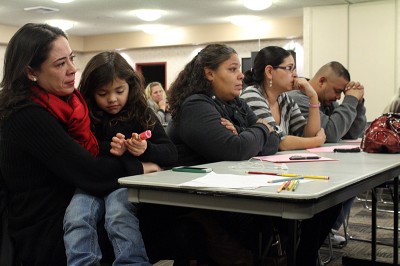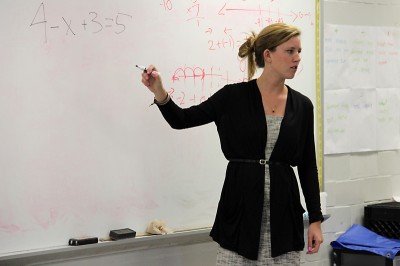Should integration be a measure of school quality?
More than 50 years after Brown v. Board of Education legally ended segregation in public schools, many districts have struggled to integrate, leaving some schools as racially divided as they were in the 1950’s. In Mississippi, private schools, often referred to as “segregation academies,” were established in communities across the state in response to actual or anticipated desegregation orders. There are more than 35 private academies in the state that opened between 1964 and 1972, and all of these schools enroll fewer than two percent black students. Many of the high-poverty, mostly black public schools in Mississippi are underfunded and under resourced, and some experts say this can affect children in a variety of ways. Can integration improve schools?
Hechinger’s Jackie Mader appeared on MSNBC to talk about this issue.
Visit NBCNews.com for breaking news, world news, and news about the economy
As Mississippi moves closer to passing legislation that would expand charter schools in the state, the debate has created a racial divide. Advocates say charter schools can provide a quality education for children in a state that consistently posts some of the lowest test scores in the nation. But opponents of the publically funded, privately run schools say that charters, which can be racially unbalanced, could become another form of segregation academies.
Visit NBCNews.com for breaking news, world news, and news about the economy
Districts face roadblocks in developing teacher evaluations
School districts around the country are facing obstacles as they attempt to finalize new teacher evaluation systems in time for the 2013-14 school year. At least 30 states have passed laws requiring new evaluation systems, but many cities are experiencing pushback from teachers and unions, particularly on requirements to include student test scores as a part of a teacher’s rating.
New York City teachers recently balked at a proposal to include student test data in the evaluations. The teachers union and city officials failed to meet a state mandated deadline to reach an agreement, which could cost the city up to $450 million in state funding. Other districts in New York received approval for their plans with just hours to spare.
A proposed bill in Connecticut would delay the start of a new statewide teacher evaluation program from 2013 to 2014 due to educator concerns about funding and implementation. And Hawaii has been warned by the U.S. Department of Education that it may lose the federal funding it won in the Obama administration’s Race to the Top initiative if it fails to secure a teacher contract that links teacher evaluation to personnel decisions. Although the Hawaii Board of Education has mandated the use of new evaluations, contract negotiations are ongoing in the state.
In other places, however, compromises have been made. Earlier this month, the United Teachers Union of Los Angeles voted in favor of an evaluation system that will rely on raw state test scores and district assessments.
The union had strongly opposed the use of the controversial “value-added” system which uses a complex formula to calculate student growth on standardized tests. Critics have questioned the validity of value-added and warned against using it for high-stakes decisions. The district has yet to determine what percentage of the evaluation will be based on student test scores.
Union president Warren Fletcher praised the agreement. “We worked hard at the bargaining table to craft a system that intelligently uses student data in the evaluation of teachers,” he said in a statement.
New Jersey has also been moving forward with new evaluations. The state launched a pilot program this year in preparation for mandatory statewide implementation of a new system in the 2013-2014 school year. The law had required districts to report their final evaluation systems to the education department by Jan. 1, but the administration extended the deadline to Feb. 15.
Is closing a struggling school the right choice?
Hundreds of schools have closed in urban neighborhoods in recent years, mostly in low-income, minority neighborhoods. Would-be education reformers like Mayor Michael Bloomberg in New York City have argued that closure is the only way to turn around some persistently failing schools. Critics have argued that closing a school is a drastic step with collateral damage that education reformers haven’t considered. Are the pros worth the cons of closing a struggling school?
Hechinger’s Sarah Garland appeared on NBC to talk about the issue:
Visit NBCNews.com for breaking news, world news, and news about the economy
It’s not the first time school districts have closed hundreds of schools in minority neighborhoods. The same thing happened during the desegregation of the nation’s schools nearly half a century ago. And back then, communities also protested.
Visit NBCNews.com for breaking news, world news, and news about the economy
What does the future hold for college costs and enrollment?
As the new semester gets under way at many colleges and universities, Hechinger’s Jon Marcus speaks with Here & Now host Robin Young about trends in cost and enrollment, and market forces coming to bear in the decision-making process.
Charter schools move forward in Mississippi
JACKSON, Miss.—Mississippi is one step closer to allowing charter schools to open in the state after the Senate Education Committee approved a charter school bill on Tuesday.
Update
On Wednesday, after more than three hours of debate, the Mississippi Senate passed their version of the charter school bill. Lawmakers approved an amendment that will allow a charter to be revoked if the school receives an “F” rating by the state for two consecutive years, instead of the original three year provision. The bill will now move to the House, which is where similar charter school legislation died in 2012. Lieutenant Governor Tate Reeves told Mississippi Public Broadcasting that he is confident representatives will support charter schools. “I think as the public gets more and more engaged and more and more involved in this debate, that the members of the House will step up and do the right thing for kids in Mississippi,” Reeves said.
The bill would allow the publicly funded, privately run schools to open in districts that have been rated poorly by the state, and would give highly rated districts the power to approve charter school applications in their areas.
Committee Chairman Gray Tollison, R-Oxford, told committee members that the bill is essentially the framework from last year’s contentious charter school fight. That proposal failed by one vote after five Republicans in the House Education Committee broke rank and voted against the bill.
This year’s proposal also renewed debate over a provision that would allow 25 percent of teachers in charter schools to be exempt from Mississippi teacher certification standards. These teachers must hold a bachelors degree, take a subject matter competency test, and complete an alternative certification program within three years.
That provision brought opposition from State Senator David Jordan, a retired teacher from Greenwood, a town in the Mississippi Delta. “This situation would be worse than the public schools that we’re trying to change,” Jordan told the committee. “If a person has a bachelors degree…in business administration, and you need him to teach chemistry, do you think he’d be prepared to do so?”
The battle over charter schools in Mississippi is nothing new for lawmakers. There have been five attempts in the past five years to introduce charter school legislation. Supporters say the schools could improve education in a state with the nation’s highest child poverty rate, and some of the lowest test scores. But opponents of the schools say that they will only reach a small number of students, and could further segregate state schools.

Students attend a summer session at Lyon Elementary School near the city of Clarksdale in the Mississippi Delta. School districts throughout the state could see increased competition from charter schools if a controversial bill passes the Mississippi legislature this session. (Photo by Jackie Mader)
Mississippi already has a charter law which is so restrictive that no charter schools have opened,
Some opponents are also skeptical of for-profit charter schools and virtual charter schools. The charter school bill included a provision that would have allowed up to three online charter schools to operate in the state, but it was stricken after Senator David Blount, D-Jackson, proposed an amendment to remove virtual schools from the bill. “Virtual charter schools are not successful at educating children as efficiently as other schools,” said Blount, to The Hechinger Report. “Children need supervision, particularly underserved students need supervision from teachers.”
The bill will now move before the full Senate, where the Memphis Commercial Appeal reports it could be considered as early as Wednesday.
Annual poll of education performance ranks Mississippi 48th
Mississippi ranked 48th — ahead of only Idaho, Nevada, and South Dakota — in an annual ranking of states’ educational performance and policy.
Quality Counts 2013, released by the weekly newspaper Education Week and the Editorial Projects in Education Research Center, grades states on a variety of indicators, including school spending, overall student performance, and college readiness.
It didn’t come as a surprise to most policy makers and educators that Mississippi posted one of the nation’s lowest overall scores, a C-minus, or 71 on a 100-point scale. As the Hechinger Report has reported this school year, Mississippi routinely rates low when it comes to child welfare and education indicators, despite some promising programs and pockets of success.
Mississippi fared particularly poorly in three categories: K-12 achievement, support capacity for teachers, and education spending. However, the state earned an A for its standards and accountability structures, which include issuing annual letter grades to school districts. Districts that repeatedly perform poorly can be taken over by the state.
Maryland, Massachusetts, and New York were the top three rated states in the annual survey.
Board OKs charter takeover of California public school after ‘parent trigger’
The real-life version of “Won’t Back Down” — the recent movie that promoted the controversial “parent trigger” law — appears to finally be getting a happier ending than the box office flop.

Parents at Desert Trails Elementary School in Adelanto, Ca. wait for the board to vote. (Photo by Natasha Lindstrom)
Parent union members at Desert Trails Elementary School in Adelanto, Calif., have become the first in the nation to convert their struggling neighborhood school into a charter school.
On a 4-0 vote Tuesday night, the Adelanto School District board approved the charter school operator selected by the Desert Trails Kids First parent union, LaVerne Elementary Preparatory Academy. It took the parent union nearly two years and a bitter legal battle to get there.
“I’m excited. I’m happy. I’m in tears — I’m holding them back,” parent union leader Cynthia Ramirez said shortly after the vote. “I can finally sleep at night.”
California’s Parent Empowerment Act of 2010, known as the parent trigger law, enables parents representing more than 50 percent of students to sign a petition to force major reforms on a low-performing school, from firing the principal and half the staff to a charter conversion. At least seven states have versions of parent trigger laws on the books, and parent trigger bills have been considered in some 20 others.
“The idea behind this movement is not simply to find and save every single failing school in the country through community organizing,” said Ben Austin, executive director of Parent Revolution, the Los Angeles-based advocacy group that trained and bankrolled the Adelanto parents. “The idea is shifting the paradigm and giving parents the power to do what’s in the best interest of their kids.”
Tuesday’s vote was quick and unanimous, and followed by a brief recess to let the parent trigger supporters celebrate. Members of the parent union and Parent Revolution exchanged hugs with each other, board members and district officials.

Parents hug after the vote. (Photo by Natasha Lindstrom)
“When the cameras are gone and the newspapers are gone, we’re still here and we’re going to work this out,” said Board President Christine Turner.
It was a drastically different scene than so many of the heated school board meetings last spring, when the board twice rejected the parent trigger petition amid a counter-campaign to get parents to withdraw their signatures. The smaller, more loosely organized group of parents opposing the parent trigger argued that some parents had been misled when they signed the initial petition.
Both sides accused the other of harassment and intimidation. The parent union argued the opposition was fueled by teachers’ union members.
The board’s rejection prompted the parent union to sue the district. In July, a Victorville Superior Court judge ruled in the parent union’s favor and said that parents couldn’t withdraw their signatures.
In the fall, the district tried to implement curriculum changes and an alternative governance committee comprised of parents in place of a charter conversion. But in October, another judge ruled the district must let the charter conversion press on.
“We do know what we want for our children,” said Doreen Diaz, who spearheaded the formation of the parent union. She’s since pulled her daughter, who is about to go into middle school, out of Desert Trails and stepped down from the union. “We proved that parents can make a difference.”
The opposing parents didn’t show up to speak at Tuesday’s meeting. One of the opposition leaders, Maggie Flamenco, said she pulled her children out of Desert Trails on Monday. She and fellow skeptics questioned the politics behind the trigger push, and the motives of Parent Revolution, which is backed by major funders like the Gates and Walton Family foundations.
The new Desert Trails Preparatory Academy charter school will be run by LaVerne Preparatory Academy, which runs a K-8 school with similar demographics in the nearby city of Hesperia. In October, the parent union held a vote open only to the parents who signed the petition to select from two charter operators. Fifty of the 53 parents who turned out chose LaVerne.
Parent union leaders said they have high hopes for LaVerne, which scored a 911 on California’s 1,000-point Academic Performance Index last year, compared to Desert Trails’ score of 699. Based on test scores, Desert Trails ranks in the bottom 10 percent in the state and has been stuck on the federal watch list for failing schools for more than six years.
The board trustees, including two newly elected members, told the meeting’s audience that they were impressed with the levels of student engagement they saw while visiting LaVerne’s Hesperia campus. The school emphasizes classical literature, Latin and music classes, and it partners with the University of LaVerne to help train new teachers.
“We’ve gone back to the basics, and we’ve raised the bar,” said LaVerne Elementary Principal Debbie Tarver.
All students and their siblings will be guaranteed spots at the school, but every teacher and staff member will have to file new applications if they want to keep working there.
Tarver said she plans to start distributing fliers to parents about the charter conversion and will be holding informational meetings as soon as next week.
The school board did place a few conditions on the approval. By March 1, the operator must send proof of the new charter academy’s registered nonprofit status, along with revised budget plans in case the academy doesn’t get the state grant funds it’s counting on.
Tuesday’s victory could be a boon for other budding parent trigger attempts throughout California and other states, with several new bills up for discussion in state legislatures in coming months.
Report: More states using student data in reform
The number of states embracing contentious education reforms meant to increase teacher accountability rose rapidly last year. In 2009, no states tied tenure to a teacher’s performance in the classroom as measured by student achievement on standardized tests. Now, 15 states have policies that base teacher tenure partly on student test scores, up from eight just a year earlier, according to a report released Monday by the advocacy group StudentsFirst.

The StudentsFirst report found that more states are using teacher performance data to make decisions on hiring, layoffs, and tenures than ever before.
The tenure reforms have drawn heavy criticism from educators who worry about the reliability and fairness of using students’ standardized test scores to judge teachers. Yet even as many states have made sweeping changes, which also include increasing the number of charter schools and rewarding teachers based on student achievement, most are not doing enough to implement education policies that will better serve students and schools, according to StudentsFirst, which was founded by former District of Columbia Public Schools Chancellor Michelle Rhee.
The group gave each state a rating of A through F based on the number and success of policies that align with StudentsFirst’s priorities such as charter schools and more rigorous teacher-evaluation systems. Only two states received a rating of “B-,” which was the highest score awarded. The report highlights which policies individual states have adopted in the past few years, providing an update on state-by-state changes to education laws following a similar report by another pro-reform group, the National Council on Teacher Quality (NCTQ), in 2011.
States like Hawaii and Louisiana, which NCTQ identified two years ago as mediocre, have since made changes that earned them relatively high ratings in the StudentsFirst report. While the Hawaii State Teachers Union has been locked in a battle with the state over a new contract that would link student test scores to teacher ratings and pay, education reformers have praised the state for creating a merit pay pilot program and funding charter schools.
And Louisiana implemented sweeping changes to its teacher-evaluation system in 2012, linking hiring, layoffs and tenure to performance. Louisiana State Superintendent John White said the report validates the “courage and boldness” of Louisiana policymakers, voters and educators. “Our schools are improving as a result,” White said. “But we still have a lot of work left to do.”
The number of states requiring districts to use a merit pay system has also increased, from three in 2011, according to the NCTQ report, to seven as of December 2012, according to StudentsFirst. More than 20 states have passed or are considering laws that would allow parents to take over failing schools.
Several states have resisted the wave of changes prompted partly by the Obama administration, which offered states and districts hundreds of millions of dollars in federal aid in exchange for overhauling their education policies through its Race to the Top program. California was ranked 51st by NCTQ in 2011 and 41st by StudentsFirst. Although a few California districts are adopting new teacher-evaluation systems and embracing controversial “parent trigger” laws, Richard Zeiger, California’s chief deputy superintendent, told The New York Times that the state disagrees with StudentsFirst’s “extremely narrow, unproven method that they think will improve teaching.”
The American Federation of Teachers (AFT) compared the StudentsFirst scores with state results on the National Assessment of Educational Progress and state grades compiled by Education Week. While NAEP scores and Education Week rankings generally correlated, the StudentsFirst rankings were dramatically different for many states. For instance, Massachusetts, which was ranked 14th by StudentsFirst and given a D+, received a B+ from Education Week and ranked first on fourth-grade reading and eighth-grade math NAEP tests in 2011.
“The StudentsFirst report cards are merely political scorecards designed to push the organization’s state legislative agenda,” wrote Carolyn Fiddler of the AFT in a statement released Monday. Fiddler added that the report cards only measure “whether states are buying into the StudentsFirst agenda.”
In new year, will Mississippi make progress in education?
Mississippi Gov. Phil Bryant has vowed to focus on education when this year’s legislative session convenes next week, with literacy and school choice at the forefront of his agenda. In a recent interview with the Associated Press, Bryant said that his goal is to get “something transformational” passed during the three-month session this year.

Skeptics of education reform plans in Mississippi say that the state should focus on early childhood literacy instead of charter schools and private school vouchers. (Photo by Jackie Mader)
But several education advocates are skeptical that change is really coming in a state that has long posted some of the worst school performance and child welfare results in the nation.
In November, Bryant released his nearly $3 billion proposed education budget, which included $2 million in funding for a teacher merit pay pilot program and $15 million for literacy initiatives. The budget was a disappointment to those who hoped that the state would finally fund pre-kindergarten. Mississippi remains the only state in the south, and one of 11 in the nation, which does not provide state-funded pre-kindergarten.
Instead, Bryant is focusing on charter schools and an initiative called “third-gate,” which would prevent most students from moving to fourth-grade until they are reading on grade level. “Theoretically, it is a good idea,” said David Morgan, coordinator of a family literacy program for the Mississippi Humanities Council, which tries to improve adult and child literacy in the state. But “logistically and financially, it’s going to be quite a burden.”
Democrats responsible for passing the state’s most sweeping education reform act more than 30 years ago have also voiced doubts, calling Bryant’s agenda items “small-scale.” The Education Reform Act of 1982 made school attendance compulsory and created a public kindergarten system in Mississippi.
Former Gov. William Winter, who persuaded legislators to pass the 1982 law, says that Mississippi has lost momentum to improve its schools. “We’ve lost that political will to do the hard things that must be done,” he said in remarks during a forum at Millsaps College. Dick Molpus, who served as Winter’s staffer and a former Mississippi secretary of state, added that the ideas being presented this year are artificial solutions that will reach only a small minority of Mississippi students.
“The fact is that we’re not funding our basic education formula,” Molpus said in an interview with The Hechinger Report. The Mississippi Adequate Education Plan (MAEP), a formula that determines how much money the state must provide to individual school districts, has only been fully funded twice in the last decade, according to a recent report in the The Northeast Mississippi Daily Journal.
Molpus has cited charter school and private school scholarship proposals as distractions from the state’s true educational needs. Last spring, a contentious charter school proposal failed by one committee vote although many officials believe this year’s measure will pass.
In an opinion piece written for the Jackson Clarion-Ledger, interim state superintendent Lynn House said that while the state’s board of education supports full funding of MAEP, they are “mindful of the current economic times and the difficult decisions our lawmakers face in funding all state services.” House highlighted what she called “sweeping reforms” that are on the agenda, such as a $2.5 million early childhood pilot program and a $1.5 million investment in drop-out prevention.
But Molpus said legislators need to move past smaller issues promoted by lobbyists and special interest groups and instead take “giant steps” in education reform. “I don’t see sweeping improvements to lift the literacy level and academic attainment of citizens of our state,” he said. “What we’re doing here…it’s infinitesimal in terms of education reform.”
Two Head Start reports find problems and some hope
The benefits children reap from Head Start, the preschool program for low-income families, disappear almost completely by third grade. While social support for children in the program is high, academic supports are low. Nearly all of children in the program live near the poverty line, more than half do not live with their fathers, and a third have a parent who is unemployed. These are the findings from two separate reports released Friday by the Administration for Children and Families (ACF), the federal agency that oversees the Head Start program.
On their face, the pair of reports seem to paint a depressing portrait of a program meant to help the most vulnerable children in the country. But amid the bad news, the researchers who compiled the reports – independent contractors commissioned by ACF – also found a few glimmers of hope.
One of the studies, by the nonprofit Mathematica Policy Research, found that parents of children enrolled in Head Start became more engaged in teaching their children at home: They increased (slightly) the frequency that they told their children stories, played games, did arts and crafts and went to the library. The report also found that children in Head Start made significant academic progress during the year on skills like identifying numbers and shapes.
The second of the studies, known as the Head Start Impact Study, is the latest in a series of reports that has looked at the academic, social-emotional and health outcomes for Head Start students over time. Previously, the study had found that gains made in preschool for children enrolled in Head Start tapered off in first grade. The latest report shows that nearly all the health benefits and academic and social emotional gains were gone by third grade. There were also some negative outcomes, including a greater likelihood of being held back.
But parenting skills continued to be better for Head Start families, and in some cases social skills and reading ability were somewhat higher for Head Start children in third grade.
“One of the strengths of the Head Start program is the parent involvement and parent engagement,” said Linda Smith, ACF deputy assistant secretary for early childhood development, in a phone interview. “And it is borne out in the study.”
Yasmina Vinci, the director of the National Head Start Association, a nonprofit advocacy group, said in a statement that the Impact study showed that “Head Start does its job – it gets at-risk children ready for kindergarten in every aspect that the study measured.” She sought to place some of the blame for Head Start’s diminishing returns on K-12 schools, rather than the preschool program. “Their circumstances continue to hinder their success; circumstances including, but not limited to, the quality of their primary and secondary education,” she said.
The Mathematic study reported that the vast majority Head Start teachers in the sample received low ratings on instructional support based on a new classroom evaluation system that is launching in Head Start centers nationally this year, known as CLASS, even as they scored well on measures of emotional support and classroom organization.
Smith said Head Start’s low scores on instruction were not an anomaly – most preschools don’t do well in the academic domain, she said. But, she added, “We are looking at these scores very closely.”
“It’s an area we are looking at very seriously here in terms of how we are training our teachers and the curriculum they select and use,” Smith said.
The CLASS evaluations are part of a major effort by the Obama administration to improve the quality of Head Start. Among other changes, the administration is requiring programs that don’t meet certain standards to “re-compete” for their federal grants. The hope is that the competition will force improvements.
“The reforms of the last four years will ensure Head Start is doing more, so the benefits will be greater and last longer,” said Head Start Director Yvette Sanchez-Fuentes in a press release announcing the reports’ findings.
This year, 132 programs had to compete for their funding, including some of the biggest agencies in the country. The Head Start office previously said it would announce the winners this month, but officials said Friday that the results of the competition will not be released until the spring for legal reasons.
CLASS and another measure of academic quality were not used to evaluate programs during the first round. But for the next round, Head Start agencies must meet new academic standards to avoid losing their federal support. Smith, of ACF, said the agency would release a list of the next round of agencies that must compete in January.



